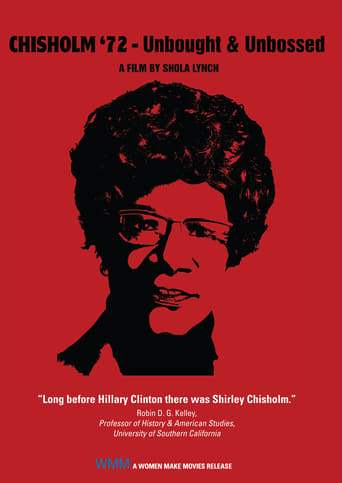romemubarak
A fierce woman standing in her own conviction who's words are anecdotal as we enter a new millennium of social change from the bottom up. A change agent who plays her hand well in an all or nothing , no compromise battle to the bitter end. Paving the way for policy makers , future radicals, libertarians and community- action oriented people alike. A splendid expose' of passion fit for the most humane of our society. She knows no bounds and never shows fear to her adversaries. Her intellect supersedes those who doubted her from the very beginning. A journey that will captivate the most conservative in us all. An excellent film of timeless proportions.
Linda
Shirley Chisholm did not take the easy road. The film doesn't really go into her motivations, so we don't now why she took on the double whammy of being not just black, but female at a time the country, even the nascent feminists, were trying to wrap their heads around what it meant to have equality of the sexes.We don't see that she had much of an organization, but the congresswoman from Bed-Sty had some aides and she traveled. Surely she needed financing to pay for the plane tickets, the hotel rooms an the salary, but it is not explained to us how she got it. The footage, both archived and contemporary, shows her with an immense amount of dignity and calm. Her uninhibited and justified comments after she is double-crossed by an old friend shows us another side. Her reflections during an interview for the film inform us that she didn't want to be remembered as the first black woman to do what she did, but rather someone who tried to make a difference. There wasn't a long line after her doing what she did. The laudatory film shows that there wasn't much future in it, even 32 years later in 2004 when Carol Mosley Braun tried it.
asa1776
Shola Lynch is apparently so obsessed with the overarching message of a black woman running for the presidency in 1972 that she fails to see the need to present any real idea of what Shirley Chisholm stood for. We are more than 45 minutes into the film before the first film clip of Chisholm taking a stand on an issue is shown, opposing the Vietnam War.The relevance of any candidate for the highest office in the land is their platform and positions. Late in the 1800s, Victoria Woodhull ran for the presidency largely on a platform of free love, and was largely ignored both at the time and by history. By securing over 150 delegates, Shirley Chisholm was clearly relevant and influential historically, but that message is lost in this film, which can never decide what it wants to be. Is the film a how-to on grassroots politics, a celebration of defiance and newfound power, or a record of the campaign? By not choosing a direction, the film flounders badly. You can sort of tell what it WANTS to be, but it never achieves it.Perhaps I (a white male) am disappointing Shola Lynch by not caring in the slightest that a candidate is black or female, either in wanting Chisholm to succeed, or in wanting her to fail based solely on those two qualifications. As a hypothetical voter in 1972 (which is the proper assumed role of any viewer of the film), I am left with little or no idea what the key issues of the day were, or where Chisholm stood on them. Therefore, how am I to decide if I would back this candidate or even partially agree? If I agree with enough of a candidate's positions, I would back them even if they were a rainbow hued left-handed albino Martian.Chisholm was a black female running for the Presidency in racially and politically charged times. Yippee-skip. By not clearly demonstrating what Chisholm stood for, and by presenting a muddled mishmash of themes, this film ultimately fails. If it is meant to be a tribute to an important and overlooked historical figure, it also fails. Not because of the relevance or irrelevance of Shirley Chisholm, but because this documentary fails to DOCUMENT. I can only hope that the biography channel will take in interest in Chisholm, so I can actually find out the critical information this film does not adequately present.
pswift
Shirley Chisholm's run for the 1972 Democratic Presidential ticket will never be a textbook case on how to run and win an election. But it does demonstrate how far determination, in overcoming insurmountable obstacles, can go in striving towards a goal. These alone are noteworthy lessons that can be uncovered in this historical and informative documentary.Because of the fact that she was a woman (and black at that), this in no way prevented Shirley Chisholm from seeking the Presidency in 1972. In fact, that she managed to stay in the race as long as she did, with at least a dozen other Democractic candidates, including front runners Muskie, Wallace, and McGovern, meant that she stayed true not only to her constituents, but also to herself. With her lippy and bold, Martin Luther King-like, impassioned vocal deliveries, Chisholm gradually won-over voters to her candidacy, and likewise scores several political talking points with its movie-viewing audience. Without the use of a narrator, it is through selective interviews with the key campaigners, strategists, politicians, and commentators of the era, that we get an undiluted, behind-the-scenes viewpoint into the financial, racial, sexual fireworks and political machinations of the era, that can taint even today's politics. However, it is the film's vibrant colors and really bouncy and funky soundtrack that really transports you into the heart and soul of this historic 1972 election that, at the same time, helps keep you genuinely interested in the dynamic politics examined by this special, unique documentary. Overall grade: B+.
